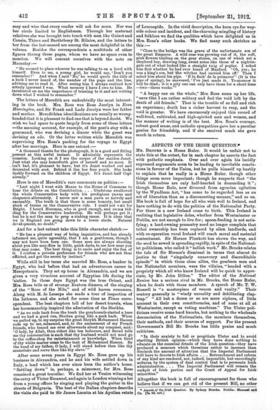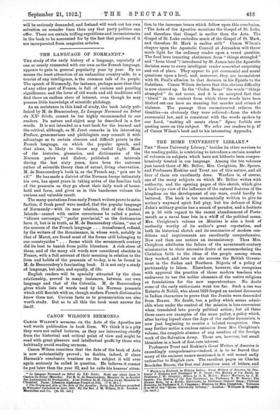ASPECTS OF THE IRISH QUESTION.* MR. Bnooxs is a Home
Ruler. It would be unfair not to state this at the outset, for in each chapter he asserts the fact with pathetic emphasis. Over and over again his lucidly expressed arguments seem to be leading to inevitable conclu- sions in favour of the Union, but he pulls himself up hastily to explain that he really is a Home Ruler, though other
things seem more important; though he suspects that "the Irish themselves are only half-hearted in demanding it " ; though Home Rule, now divorced from agrarian agitation by the Wyndham Act, " has come to be regarded less as an act of liberation than as a disconcerting menace," and so on. His book is full of hope for all who wish well to Ireland, and have nothing to do with the politics of the Nationalist Party.
For there is a new Ireland come to birth. This Ireland is realizing that legislative doles, whether from Westminster or Dublin, are not enough to live for ; spoon-feeding is not satis- fying ; a land-owning peasantry need no longer complain that tribal ownership has been replaced by alien landlords, and with co-operation rural Ireland will reach moral and material contentment. Sir Horace Plunkett has shown the way, and the seed he sowed is spreading rapidly, in spite of the National- ist politicians, who called it " hellish work." Mr. Brooks relates the tale of Sir Horace's dismissal in terms that almost do justice to that "singularly unsavoury and discreditable episode" in which those close allies, the gombeen men and
the Nationalist members, were the villains, " headed with a propriety which all who know Ireland will be quick to appre- ciate, by Mr. John Dillon." The editor of the National Review has a serious rival in Mr. Brooks, the Home Ruler, when he deals with these members. A speech of Mr. T. W. Russell is "a masterpiece of venom and vanity." Their oratory generally is "windy unreality and debilitating clap-
trap." " All but a dozen or so are mere ciphers, of little account in their own constituencies, and of none at all at Westminster, except as voting machines." The Ulster poli- ticians receive some bard knocks, but nothing to the wholesale denunciation of the Nationalists, the members themselves, their methods, and their sources of support. For the present Government's Bill Mr. Brooks has little praise and much criticism.
"In their anxiety to foil or propitiate Ulster and to avoid startling British opinion—which they have done nothing to educate on the essential details of the Irish question—they have produced a measure which threatens rather to increase than diminish the amount of attention that the Imperial Parliament will have to devote to Irish affairs. . . . Retrenchment and reform of any kind are rendered, not, indeed, impossible, but exceedingly arduous, by the system of dual control that is to permeate Irish administration. . . . The Imperial Parliament will remain the cockpit of Irish parties and the Court of Appeal for Irish' minorities."
Altogether the book is full of encouragement for those who believe that if we can get rid of the present Bill, no other * Aspects of the Irish Question. By Sydney Brooke. Dublin: I/sunset and Co. [Ss. 6d. net.]
will be seriously demanded, and Ireland will work out her own salvation on sounder lines than any that party politics can offer. There are certain trifling repetitions and inconsistencies in the book to be accounted for by the fact that portions of it are incorporated from magazine articles.











































 Previous page
Previous page